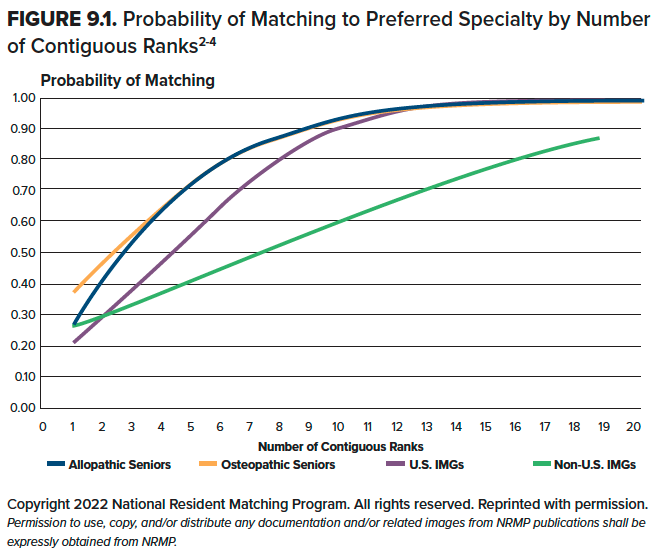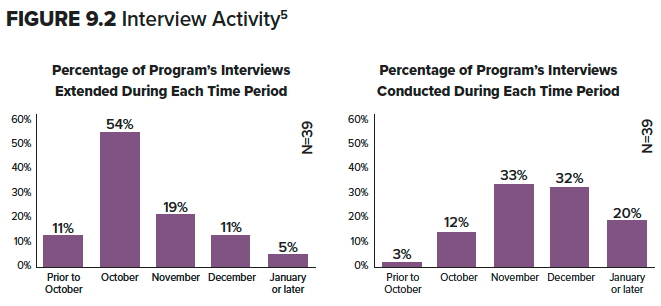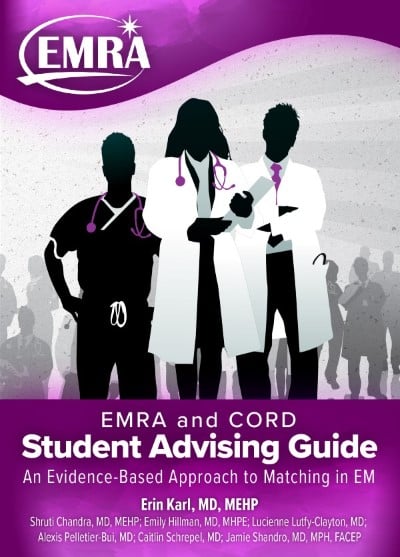Ch. 9 - Interview Season Logistics
The interview season can be both an exciting and memorable part of your journey through medical school. While the logistics of planning your interview trail can seem daunting at first, whether in-person or virtual, understanding some trends in the NRMP Match data and preparing in advance can ensure you make the most of it. In recent years, there has been a reliance on virtual interviews. Since we do not yet know how recommendations regarding the format for interviews may change over the years, it is crucial that you reach out to your medical school and advisors to understand the expectations for in-person vs. virtual interviews for each interview season. However, regardless of the format of interviews, there are some specifics about the interview process you should understand.
How important are residency interviews?
Residency interviews play a crucial role in your Match success. Each interview is a way for the program director, faculty, and residents to get to know you personally. Your performance on interview day is a significant factor in determining your placement on the program’s rank list.
In the 2021 NRMP Program Director Survey, 82.4% of programs considered interpersonal skills an important factor in ranking applicants — the highest endorsed response of all personal characteristics measured. Additionally, greater than 70% considered interactions with faculty and residents on interview day a key component. Together, these were considered to be more important elements in ranking applicants than USMLE/COMLEX scores, class ranking, volunteer/extracurricular activities, personal statements, and post-interview communications.1
How many interviews should I go on?
There is no universal answer to how many interviews will guarantee a match, but NRMP data can guide you. Your match depends on how you rank your programs and how the programs rank you. A match can only occur if both parties are ranked by one another, and programs will only rank you if they’ve interviewed you.
The probability of matching is related to the number of contiguous ranks. For MD and DO senior medical students, the probability of matching is 80% at around 6-7 contiguous ranks and becomes > 95% at around 11-12. The mean number of contiguous ranks for matched MD and DO seniors is 15 and 12.6, respectively.2,3 Therefore, the typical applicant should aim for a number of interviews within this range. International medical graduates (IMGs), particularly non-U.S. IMGs, likely need to aim for a higher number (see figure 9.1).4
In Chapter 8: Understanding Your Competitiveness: Apply Smarter, not Harder you can find information to assess your competitiveness. Remember, application recommendations exist to support you in obtaining 11-12 interviews. With a 100% match rate into EM for all U.S. MD and DO seniors (not including those who dualapplied) with at least 11 ranks in 2022, accepting greater than 14 interviews could very well be considered a faux pas to your peers and future colleagues.2,3

IMG Candidates: For non-U.S. IMGs, 14 contiguous ranks correlates to an ~87% probability of matching (nears 100% for U.S. IMGs with 14 contiguous ranks).4 Some programs will not interview IMGs, and this data is available as a filter on EMRA Match. The overall decrease in applications to EM may lead to an increase in receptiveness to IMG candidates, but it will take time to know if this is the case.
Latecomers: If you applied particularly late in the season, you may face challenges getting the recommended number of interviews. If this is the case, work closely with your advisors and consider the following:
- You can intentionally go unmatched and try to SOAP into an EM training position. Before 2022, EM had historically had few, if any, unfilled spots. With the decreased number of applicants to EM overall, for the foreseeable future, there will likely be EM positions available in the SOAP (Supplemental Offer and Acceptance Program). However, this might change from year to year, so intentionally going unmatched and relying on the SOAP to match comes with significant risks.
- With your advisor’s help, develop a backup plan. Depending on your situation, this may mean dual applying to a preliminary/transitional year and/or another specialty. If you plan to re-apply in EM, make sure you understand GME funding rules to avoid future complications.
- Many medical schools have an opportunity to split fourth year. This maintains your eligibility for the Match, does not create a gap year in your application, and maintains financial aid and GME funding.
- Emergency medicine is a growing specialty, and brand-new programs occasionally fill their first class outside the match. This is uncommon, but worth exploring if the opportunity arises.
- Don’t expect to be able to complete a different residency, such as family medicine or internal medicine, with the expectation of practicing EM afterward. This is advice that many individuals outside of EM will offer as a secondary option. As EM grows, the demand for ABEM board-certified physicians also grows. Without completing an EM residency, you will not be board-eligible. This leads to VERY limited job opportunities.
- Above all, speak with an EM-specific advisor and your medical school deans about your options. Each program, applicant, and application is different, and expert advice and assistance can make a difference in whether you match.
Juggling the Schedule
In the past several years, the CORD County Program Community of Practice has selected a “unified interview release date”, in which all EM programs (not just county programs) can voluntarily participate. In 2022, more than 55 programs participated, extending interview invites on October 19 and opening interview scheduling on October 20. Make sure to check out the EMRA and CORD websites and social media accounts for upcoming unified interview release dates, as you will want to ensure you have adequate time on these dates for accepting offers and scheduling interviews.
The majority of interview invitations are extended in October; however, additional invitations occur throughout the entire interview season as students cancel and more dates become available. Generally, interviews are conducted in October through January, with the majority occurring in November and December. Appropriate scheduling and planning of your academic schedule is a vital part of ensuring that you have the availability to attend your desired interviews.

Couples Match: Coordinating interviews is less of a concern with virtual interviews and travel costs not being a factor, but it is still nice to be able to compare notes with your partner in real time. For any in-person interviews, many programs will work with you to try to coordinate the timing of your interview to align with your partner’s.
Military Match: Students must arrange interviews with programs separately from the MODS application, often via email with the program coordinator early in the year. If you are offered the choice between a video or inperson interview, try to schedule an in-person interview whenever possible. Consider scheduling civilian interviews late in the season (mid-December to January). This allows adequate time to cancel your interviews if you match in a military program.
During the interview-heavy months, one strategy is to dedicate an entire month to interviews if your school allows it. Another strategy is to purposefully schedule rotations that are less rigorous or do not necessarily have clinical requirements. If you cannot arrange for such a schedule, talk to your advisor about elective options that are more conducive to being available for interviews.
At-Risk Candidates: If you are a less competitive applicant, early interviews might not be as forthcoming. It may be beneficial to plan to take off January for interviews rather than one of the earlier months.
Latecomers: Depending on when you submitted your application, leaving January available for interviews may be a good plan for you, too.
Remember, programs generally offer an optional social event — either a dinner for in-person interviews or a virtual meet-and-greet experience. This may be held the night before, the night of, or sometimes the night after your interview. While these events might not be expressly mandatory, attendance is strongly recommended. These informal gatherings are an important way to meet the residents, learn about the culture of the program, and show your interest. Notably, these events are also a key way for programs to get a sense of how you interact with your future colleagues.
Exercise caution when scheduling multiple interviews back-to-back. For in-person interviews, this might be helpful or necessary in cutting down on travel costs or time away from clinical duties. However, prolonged periods of travel can also be exhausting and may adversely affect your performance on interview day. Interviewing virtually can be similarly taxing. Appearing tired may be misinterpreted as being disinterested and can potentially hurt you in the ranking process, so avoid scheduling more than three interviews in a week until you get a sense of your personal endurance and preference on this.
Communication and Scheduling Etiquette
Interview offers may be extended through a scheduling system (eg, Interview Broker, ERAS Interview Scheduler, Thalamus, etc.) or sent directly from the program itself. Applicants typically receive notification of interview offers via email. Sync your email to your mobile device or even create a separate email account specifically for the ERAS application and interview season to ensure you don’t miss any offers. It is also a good idea to routinely check your junk or spam folders in case some invitations are accidentally routed there.
Handle interview invitations promptly. As of the 2023 NRMP Match, it is a violation if programs send out more interview invitations than available interview spots.6 However, more desirable interview slots might fill quickly after invites are sent. When securing a spot, there may be an option to choose either the morning or afternoon. Once scheduled, programs such as Interview Broker will email a confirmation to you of the date/time of the interview. If you find yourself using multiple websites or applications to schedule interviews, it may also be advantageous to dedicate a planner or calendar to keep track of all of your interviews.
Be professional if you need to cancel. Some cancellations are necessary because of scheduling conflicts with your clinical rotations or other commitments. Others may be canceled because an applicant feels they have scheduled enough interviews to secure a match. No matter the reason, advance notice is a must. Try to cancel far enough in advance to allow the program time to find another applicant to take your place. Generally, cancellations should not be made less than two weeks from the date of the interview — a month or more beforehand is ideal.
Don't harm your chances before you even arrive for the interview. Other scheduling behaviors that reflect poorly on you include interview hoarding, double-booking, and no-shows. In the rush of initial interview offers, it’s tempting to accept every offer — even if you have no real interest in a program. Resist this urge. Remember that everything you do can be evaluated by programs, and unprofessional behavior can dramatically influence programs’ perceptions of you. Once you have obtained enough interview offers at programs where you have a genuine interest, it is unnecessary to hoard additional interviews. With enough cancellation notice, those spots can be freed up for other students.
If you double-book, decide which interview you will attend and let the other program know you will need to cancel as soon as possible. While double-booking can be tempting, particularly if you are unsure which program you like best, understand that it is highly frowned upon. In fact, scheduling services actively combat them through different policies. ERAS does not allow any double booking. Interview Broker has a double-booking policy that notifies both programs at 48 hours if you do not resolve the conflict. Retaining a double-booking past 48 hours may lead to programs rescinding your interview offers. After you submit your applications and while awaiting interview offers, create a pre-ranking list of your programs by desirability. When you achieve an excess of interviews or find yourself double-booked, use this list to choose which interviews to give up.
Finally, it is important to attend the interviews you schedule. No-showing is unprofessional and can hurt your chances of matching. Word can (and likely will) get back to your school’s dean and your home institution’s PD. Remember this is very much a job interview. Your professionalism is being evaluated at every stage of the process.
Virtual Interviews. Beginning in 2020, EM residency interviews switched to an entirely virtual format and continued in this way in the 2022-2023 interview season. While each program has a different style, there are some considerations that will help you stand out in the mosaic of Zoom squares. See Chapter 10: Making the Most of Interview Day for more information on virtual interviews.
Second Looks. In the era of virtual interviews, many residency programs are hosting optional, formal second looks. This will usually be a weekend with tours of the hospital(s) where you will work, sightseeing, and meeting your potential future co-residents at a lunch and/or dinner. They typically will occur from January to late February, ideally after the program solidifies its rank list and before you submit yours, so be on the lookout for an email invitation. See Chapter 10: Making the Most of Interview Day for more information on the logistics of second looks.
Managing Costs on the Interview Trail
Interviewing is expensive, particularly when done in person. A recent poll showed that nearly all applicants (97%) agree that virtual interviewing has decreased the price tag on residency interview season.7 Even so, the cost one might spend on traveling to explore cities and institutions on second looks, along with the increasing number of programs to which applicants apply, all add up to a heavy financial burden. While some of these costs are unavoidable, there are a few ways to reduce your expenses for any in-person interviews and/ or second looks you might have.
- Use credit cards with rewards programs — and learn the intricacies of those programs.
- Bunk with friends (or friends of friends), and check out services like Swap & Snooze, which arranges free lodging for medical students on the interview trail.
- When possible, stay with residents from the program where you are interviewing. Sometimes this opportunity will be obvious in pre-interview communication with the residency program coordinator; if not, there is no harm in asking.
- Plan your interviews to maximize your travel dollar; cluster interviews geographically.
- Consider driving instead of flying.
Unfortunately, the process of applying and interviewing is expensive, but it is an important investment in your career. Anticipating the cost will allow you to budget appropriately, and careful planning can help alleviate additional stress.
The Bottom Line
- Recommendations regarding in-person and virtual formats for interviews will likely change throughout the years. Always check with your advisor, EMRA, and CORD for the most up-to-date interview season recommendations.
- Average, reasonably competitive applicants should aim to go on enough interviews to be able to rank 11-12 programs, which correlates with a > 95% chance of matching for U.S. MD and DO seniors.
- The majority of interview invitations are sent in October, and the majority of interviews are conducted in November and December.
- Be considerate of your colleagues and programs during interview season. Hoarding interview invitations at programs you don’t intend to rank takes away interview opportunities from your colleagues, and if you wait too long to cancel, it makes it difficult for the program to book someone else in your place.
- Plan your interviews wisely, taking into account practical scheduling factors and other social events that may be offered on, before, or after the interview day.
- Prepare to budget for travel if you intend on visiting programs or checking out the areas in which they are located.
References
- National Resident Matching Program, Data Release and Research Committee: Results of the 2021 NRMP Program Director Survey. National Resident Matching Program, Washington, DC. 2021. https://www.nrmp.org/wp-content/uploads/2021/11/2021-PD-Survey-Report-for-WWW.pdf.
- National Resident Matching Program. Charting Outcomes in the Match: Senior Students of U.S. MD Medical Schools. July 2022. https://www.nrmp.org/wp-content/uploads/2022/07/Charting-Outcomes-MD-Seniors-2022_Final.pdf.
- National Resident Matching Program. Charting Outcomes in the Match: Senior Students of U.S. DO Medical Schools. July 2022. https://www.nrmp.org/wp-content/uploads/2022/07/Charting_Outcomes_DO_Seniors_2022_Final-Updated.pdf.
- National Resident Matching Program. Charting Outcomes in the Match: International Medical Graduates. July 2022. https://www.nrmp.org/wp-content/uploads/2022/07/Charting-Outcomes-IMG-2022_Final.pdf.
- National Resident Matching Program, Data Release and Research Committee: Results of the 2020 NRMP Program Director Survey. National Resident Matching Program, Washington, DC. 2020. https://www.nrmp.org/wp-content/uploads/2022/01/2020-PD-Survey.pdf
- Match Participation Agreement Program: 2023 Main Residency Match and Supplemental Offer and Acceptance Program (SOAP). Violations. https://www.nrmp.org/wp-content/uploads/2022/09/2023-MPA-Main-Match-Program-FINAL-3.pdf
- Domingo A, Rdesinski RE, Stenson A, et al. Virtual residency interviews: Applicant perceptions regarding virtual interview effectiveness, advantages, and barriers. Journal of Graduate Medical Education. 2022;14(2):224-228.





